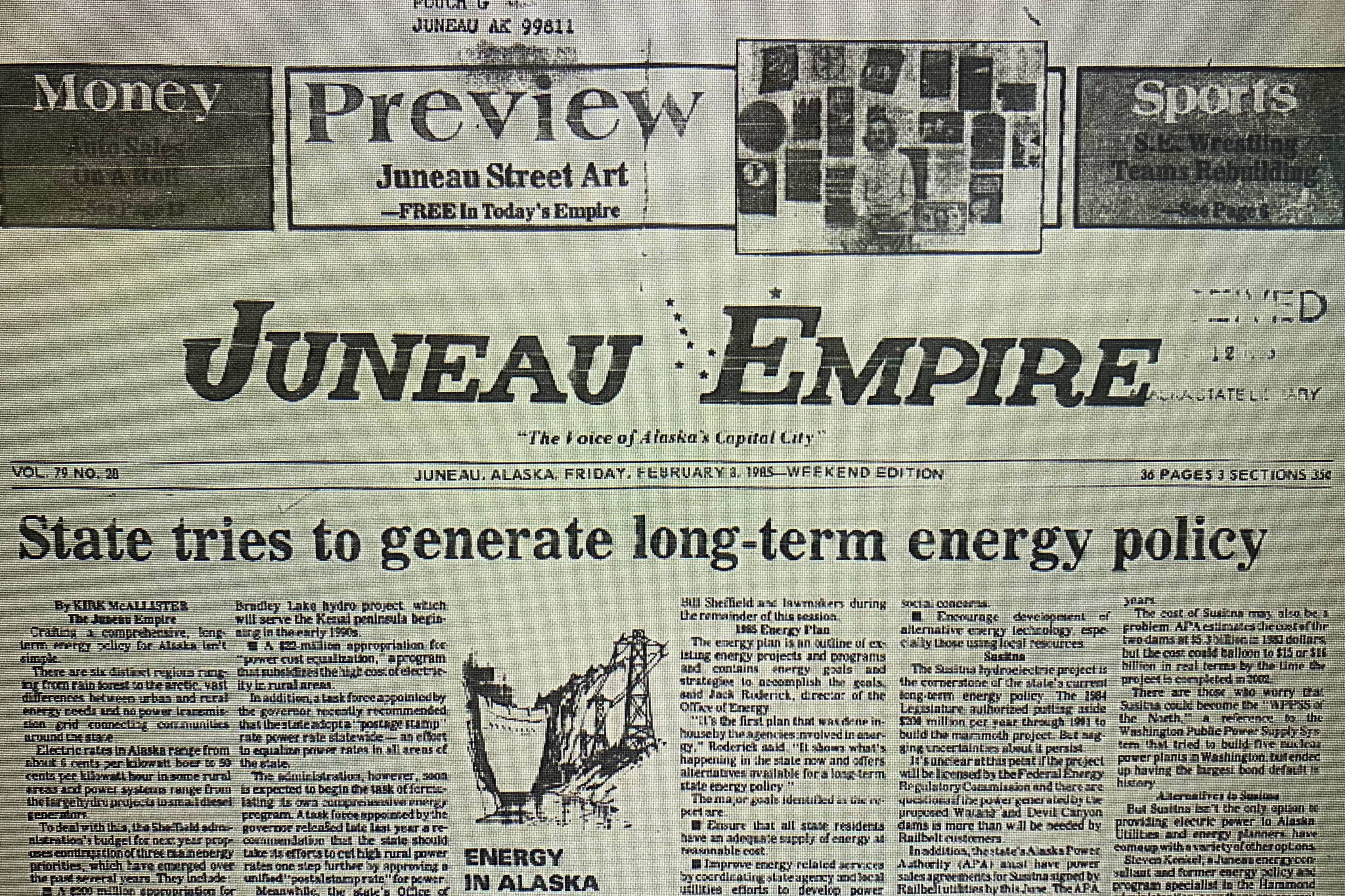Empire Archives is a series printed every Saturday featuring a short compilation of headline stories in the Juneau Empire from archived editions in 1985, 1995 and 2005. They include names, AP style and other content of their eras.
This week in 1985, crafting a comprehensive, long-term energy policy for Alaska isn’t simple. There are six districts ranging from rain forest to the arctic, vast differences between urban and rural energy needs and no power transmission grid connecting communities around the state. Electric rates in Alaska range from about 6 cents per kilowatt hour to 50 cents per kilowatt hour in some rural areas and power systems range from the large hydro projects to small diesel generators. To deal with this, the Sheffield administration’s budget for next year proposes continuation of the three main energy priorities, which have emerged over the past several years. They include: 1) a $200 million appropriation for the Susitna hydroelectric project to provide power to the Railbelt, 2) a $50 million appropriation for the Bradley Lake hydro project, which will serve the Kenai peninsula beginning in the early 1990s and 3) a $22 million appropriation for “power cost equalization,” a program that subsidizes the high cost of electricity in rural areas.
Today similar issues and proposed projects are among the top priority of Alaska lawmakers facing critical energy supply and infrastructure issues, primarily in Southcentral Alaska. Cities and utilities in the area are also scrambling for ways to cope with a projected shortfall of gas from Cook Inlet, which has supplied the region for decades.
Original Story: “State tries to generate long-term energy policy,” by Kirk McAllister. 2/8/1985.
This week in 1995, the Knowles administration is supporting a controversial plan to create new conservation zones in the Tongass National Forest because such action may head off listings under the Federal Endangered Species Act. The new state policy — set out in a Jan. 13 letter to the U.S. Forest Service — has drawn guarded praise from conservationists, who say it marks a shift toward cooperation with federal Tongass policy makers. It drew sharp attacks from the timber industry. The Knowles letter replaces a Dec. 5 policy letter by the Hickel administration that challenged the whole idea of new Tongass conservation zones. The Knowles letter says the state is concerned the creation of new no-cut ones would hurt the logging industry and Southeast communities. But it also puts forth the concerns of state biologists who fear the loss of brown bear and other wildlife species. The administration recommends that two conservation areas be expanded to include more old-growth forest.
Today similar battles over use versus non-use are still being fought along similar ideological lines, with the industry side having the upper hand since President Donald Trump signed an executive order upon returning to office repealing the Tongass Roadless Rule. That rule has been enacted and repeated in cycles that have shifted between Democratic and Republican presidential administrations for more than two decades.
Original Story: “Timber policy shifts” by The Associated Press. 2/22/1995.
This week in 2005, members of Congress who have successfully blocked oil drilling in the Arctic National Wildlife Refuge for more than a decade vowed to do everything, including a Senate filibuster, to protect the preserve again this year. But they say there is a real possibility they will fail this time. “If there ever was an occasion to support a filibuster, this is,” said Sen. Joe Lieberman, D-Conn., who attended a rally Wednesday with environmental groups. “There are not 60 senators who will vote for drilling.” But he and others agreed that if Republicans put the drilling legislation in the budget resolution, which is not susceptible to a filibuster, there’s a greater chance it will have the votes to pass. Republican gains in the Senate give President Bush his best chance yet to win approval for oil drilling in the refuge, which is one of his top energy priorities. The GOP now has a 55-44-1 majority in the Senate, compared with a narrower margin last year – 51 Republicans, 48 Democrats and one Democratic-leaning independent. “The timing is right this year,” said House Resources Committee spokeswoman Jennifer Zuccarelli. “There are new senators who are coming on supporting us, and I think it’s going to happen this year.”
Today oil exploration and other resource extraction activities in Alaska are getting a bright green light from President Donald Trump, who issued an executive order on his first day back in office essentially ordering the elimination of any federal regulations that inhibit the U.S. from maximizing such activity in the state.
Original Story: “Arctic wildlife refuge defenders fear time is up,” by Lolita C. Baldor. 2/3/2005.
• Contact Mark Sabbatini at mark.sabbatini@juneauempire.com or (907) 957-2306.

